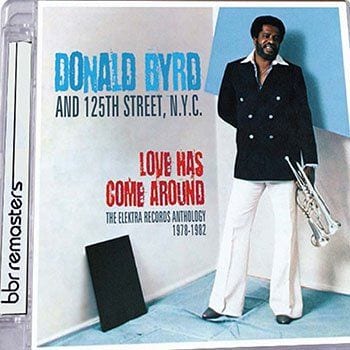
By the time the great jazz trumpeter Donald Byrd got around to cutting these sides in the late ‘70s and early ‘80s, the idiom was very much at a crossroads. Having been pushed further and further into an R&B and funk direction — not to mention the guitar pyrotechnics of such rock oriented fusion acts as Mahavishnu Orchestra — jazz was facing something of an identity crisis by the end of the decade. Struggling to remain relevant and marketable to a broad demographic, the lines between traditional jazz players and the commercial R&B markets blurred to the point of near non-existence. Having been supplanted by the rock, R&B and pop artists of the ‘60s as the dominant form of popular music, jazz musicians were forced to embrace the styles that had replaced them.
This succeeded to varying degrees. To be sure, there were a number of highly successful and landmark fusions of jazz and pop/jazz/R&B: Herbie Hancock’s Headhunters with its bastardization of Sly and the Family Stone and James Brown’s funk grooves; Miles Davis’ Bitches Brew and its stark appropriation of both Sly and Hendrix going electric and, in the process, launching the careers of the next decade’s biggest names in jazz and the newly christened fusion.
After nearly 20 years on Blue Note, 1978 saw Byrd as something of a free agent. Having rebranded himself earlier in the decade alongside the Mizell brothers Larry and Fonce, Byrd was, by this point, no stranger to straight R&B. His 1973 release Black Byrd was unapologetically aimed at a pop market, its R&B grooves a far cry from his hard bop beginnings. Furthering that, he helped shepherd the Blackbyrds — a group made up of Howard University students, where Byrd happened to be the head of the jazz department at the time — to full-fledged jazz/funk/R&B legitimacy with their landmark self-titled 1974 debut release.
Yet within just a few short years, it became clear that the well of stylistic innovation that had once served Byrd so favorably had begun to run dry. Beginning with 1978’s Thank You…For F.U.M.L. (Funking Up My Life), Byrd fully surrendered to the commercial market, making a series of impeccably produced, arranged and performed MOR disco funk albums that ultimately represented at its most milquetoast. Having left both the Mizell brothers and Blue Note behind in favor of Elektra Records, the end of the ‘70s and ‘80s served as Byrd’s descent into (temporary) recording oblivion.
It is within this commercially-minded context that Love Has Come Around: The Elektra Records Anthology 1978-1982 seeks to force a reexamination of Byrd’s efforts during the height of the disco era. With the four albums he cut during this time diced and spliced across the set, the usual chronological approach is eschewed in favor of a more aesthetically pleasing flow. And while there are certainly some top-notch moments (“Love Has Come Around” and “Loving You”, in particular), they are far outweighed by a series of faceless productions aimed straight at the increasingly coked-out dancefloor. After these two –– both of which appear on the first disc and within the first ten minutes of the album — the tracks become interchangeable; all roughly the same tempo, style, and feel, albeit often very, very funky.
And while Byrd’s name is on the cover, his iconic trumpet sound barely registers. To be sure, Byrd was functioning in more of a producer role on the majority of these recordings — along with Isaac Hayes — and thus not meant to necessarily function as the center of attention. But when he does appear, it almost feels like an afterthought, his spiraling trumpet lines bleeding into the mix from another session. And though he assembled a number of name musicians to help with these sessions — Dee Dee Bridgewater, Patrice Rushen, Lenny White, Syreeta and Hayes’ own Hot Buttered Soul Unlimited can all be heard across the collection — none sound particularly inspired.
Of course the rote nature of the material doesn’t help matters, relying lyrically and musically on the overriding disco and Quiet Storm tropes of the day. Because of this, it’s hard to approach this collection within the context of Donald Byrd as a renowned jazz trumpeter given the blatantly commercial approach taken herein. Instead, it should be viewed as Byrd in the role of pop music producer in which case he is competent but far from forward-thinking or envelope-pushing. Indeed, so much of Love Has Come Around sounds so much like everything else being produced at the time that the names of those behind not only the board but the recording sessions themselves could be wholly interchangeable without anyone really taking note; these are studio musicians doing what studio musicians do best and ultimately simply cashing their checks at the end of the day.
Fortunately for Byrd, his reputation would recover by the start of the 21st century, coming to be viewed as a stylistic pioneer for his work with the Mizell brothers. While certainly a part of the Donald Byrd story, the recordings represented on Love Has Come Around: The Elektra Records Anthology 1978-1982 are less than indicative of his otherwise stellar reputation. Only those looking for the complete story will want to spend any amount of time with tracks like “Your Love Is My Ecstasy”, “Have You Heard the News” or any of the other dozen tracks out of 31 that contain some variation of the word “love” in the title. All others are encouraged to look elsewhere for their introductory dose of the great Donald Byrd.


![Call for Papers: All Things Reconsidered [MUSIC] May-August 2024](https://www.popmatters.com/wp-content/uploads/2024/04/all-things-reconsidered-call-music-may-2024-720x380.jpg)



